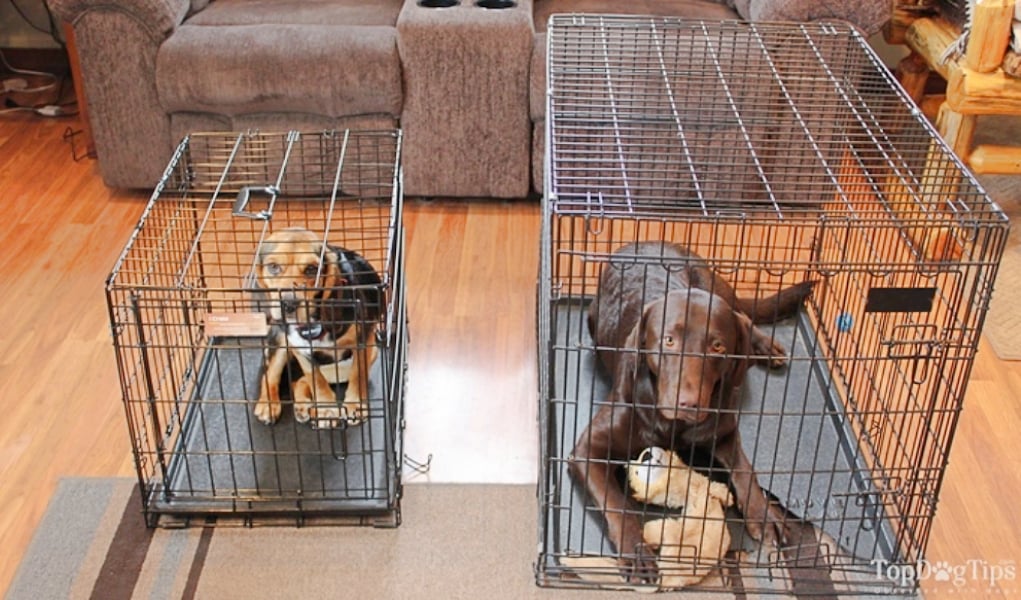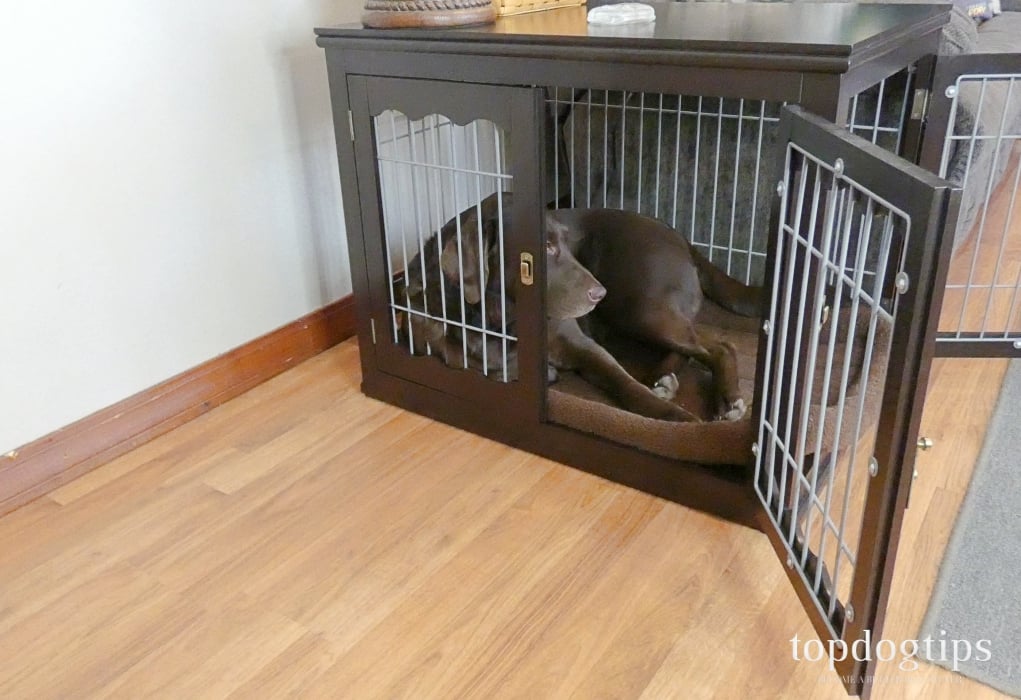If you're reading this article, you're probably working on crate training a dog for the very first time. You may be feeling guilty or overwhelmed. Don't worry. That's normal. Crate training a dog can be a difficult task, especially when you have to deal with a dog crying in crate.
Some people think crate training is cruel, but I have a lot of experience crate training many different types of dogs and I think it's one of the best things that you can do. When done properly, crate training is beneficial for you and your pet.
Studies on domesticated dogs have shown that canines have evolved to seek out dens. When properly introduced and used, a dog crate can actually serve as a familiar and safe place of comfort and security for your dog. At the same time, a crate should not be used as a way of correcting behavioral problems or as punishment for the dog.
Typically, after the proper crate training phase is finished, dogs will associate it with a safe environment where they can rest, relax and have some time and space to themselves. Using a dog crate also helps owners with training their dogs and structuring a routine.
Crate training is something that needs to be taken very seriously. You can't just start locking your dog in a crate and expect him to wait there until you're ready to let him out. It's a gradual process that will take many weeks.
Dog Crying in Crate? Here's What To Do
 Is Fido comfortable?
Is Fido comfortable?
One of the most common reasons why you'll hear your dog crying in crate is because he's uncomfortable. The crate should be big enough for your dog to stand up and turn around without bumping into the top or sides.
Buying a crate that's too big isn't good either. It defeats the purpose of your dog having their own “safe space”. If he has too much space, your pup will treat his crate the same way he treats any room. He may even pick a corner to use as a bathroom area.
It's important that you measure your dog properly and choose the right size crate. For measuring instructions and help with choosing the best crate size for your pet, check out our crate sizing guide.
Provide some type of bedding for your pooch to lie on. You wouldn't want to spend your day lying on the cold, hard floor, would you? Dog crate pads are affordable on any budget and they offer a warm, soft layer between your pup and the crate floor.
Is he bored?
I can only imagine how boring it would be to sit in a dog crate all day waiting for someone to come home and let me out. How do you think your dog feels? If he's still full of energy when you put him in his crate, he's going to be bored waiting for you to come home.
Some of the common signs that your dog is bored in his crate are destructive behavior, chewing the crate bars, dog crying in crate and excessive barking. Make sure to spend plenty of time exercising your pooch before putting him in the crate for an extended period of time.
Go for a walk, play a game of fetch or give him time to run around and explore in your backyard. Your dog's energy level will determine the amount of exercise he'll need. For example, young puppies will need to burn a lot more energy than older, lazier dogs.
You can provide interactive toys to entertain your dog while you're away. Stuffing toys with an exciting treat (like peanut butter) will also provide some stimulation while you're gone. Burning excess energy will make your dog sleepy, so he'll be more apt to nap in his crate than whine.
ALSO: Puppy Crate Training Schedule
 Make it a GRADUAL process
Make it a GRADUAL process
Many people make the mistake of simply putting their dog in the crate, locking the door, and leaving for hours at a time. This will make your dog fear the crate, and it can cause some serious issues with crate training dogs and housebreaking down the line.
The only way to be successful at crate training is to make it a very gradual process. Start out by letting Fido explore his crate at his leisure. He'll likely sniff around and go in and out as he pleases.
Rewarding him for going into the crate of his own accord with lots of praise and treats. Eventually, your dog will enter the crate to chew a toy or take a rest. That's when you'll know that he's comfortable with the crate.
Once he goes into his crate regularly, feed your pet inside the crate to continue getting him used to it. After a few successful meals, start closing the door while your dog eats. Start by remaining in the area, but eventually go to another room to see how he does in his crate alone.
Keep closing the door for increasing lengths of time, always monitoring your dog's anxiety level while in the crate. If he is doing okay for half an hour, you can start leaving him inside the crate for short periods of time while you leave the house.
Is it separation anxiety?
Separation anxiety is a very possible cause of dog crying in crate. Assume this is the cause if they're visibly anxious whenever you step out of the room, regardless of how far you go. To prove this theory, let your dog out of the crate and leave the house. If his reaction is exaggerated, such as excessive and loud barking, whining and/or scratching at the door, it's likely that he has separation anxiety.
If this is the case, you may not be able to crate your dog. Being confined in a small area can make the anxiety worse. Their are over-the-counter products that may help dogs with mild separation anxiety, but if your dog's case is severe you may need to look into doggy daycare or hiring a pet sitter.
Whatever you do, NEVER punish your dog for whining. It is your dog's way of communicating that something is wrong. Figure out why he's crying, and help to solve the problem. When done properly, crate training will be beneficial for both you and your pet.












